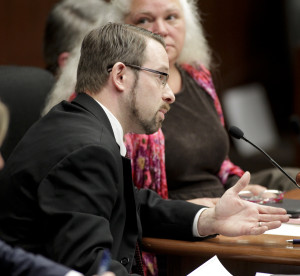Safeguarding rights to privacy behind proposed MN commission

By Tom Steward | Watchdog Minnesota Bureau
ST. PAUL, Minn. — To see why a commission to safeguard Minnesotans’ rights to privacy and access to public data may be a slam dunk at the Capitol, check out the complex questions posed to state officials at Open Secrets MN.
- “Do you believe that a broad pattern of governmental surveillance activity — such as monitoring a person’s location information on an ongoing basis — invades a reasonable expectation of privacy, and constitutes a search?”
- “Do such things as license plate reader scans (LPR) and the Kingfish (cell tracking system) infringe on the protections of the First, Fourth, and Fifth amendments in your view?”
- “Would your department support the use of small, low-flying drones to serve as platforms for ongoing video surveillance of public areas?”
“Technology is moving at warp speed, and the Legislature is being run over by snails at the rate they move in setting policies,” said state Rep. Mary Liz Holberg, R-Lakeville.
A longtime privacy-rights advocate retiring this year, Holberg has authored a bill to establish the Legislative Commission on Data Practices and Personal Data.
Chilling questions about whether technology available to government crosses the line of collecting information on Minnesotans without their knowledge or constitutional constraints also appear on the Open Secrets MN blog.
- “Does your agency plan on integrating facial recognition technology into its surveillance systems?”
- “Has your department studied, or otherwise contemplated the use of, so-called “domain awareness” technology that integrates video feeds, Twitter feed monitoring, and other data streams with so-called “predictive” crime analysis software?”
“I’ve been working for the last (two) or (three) years doing a lot of data requests,” said Rich Neumeister, a citizen watchdog who blogs at Open Secrets MN. “I’ve been wanting to find out how technology has changed on one end and then how it easy it’s been for government to get access to our personal papers and records and data.”
The commission would track new technology and data-collection tools available to government in an effort to balance privacy and public safety concerns through legislation.
PRIVACY AND PERSONAL DATA RIGHTS AND WRONGS: Matt Ehling of the Minnesota Coalition on Government Information testifies in favor of new commission to balance rights to privacy and public safety as bill’s author, Rep. Mary Liz Holberg, looks on.
While not given enforcement powers, the legislative group also would guard against attempts to curtail access to public information. Holberg’s bill, H.F. 2120, is expected to be debated soon by the Minnesota House after passing the Minnesota Senate.
“It’s one area where liberals and libertarians intersect,” said Gary Hill, a former broadcast journalist and board member of the Minnesota Coalition for Government Information. “It is our government and we need to know what our government is doing. That includes what deep data it’s collecting and what that data in aggregate at least says and tells us, so that we can have a check on government.”
Typically an advocate of smaller government, Holberg points to the controversy over Automatic License Plate Readers — used by police to collect and store information on drivers — in the case for creating a state commission to vet technology before implementation.
“In the crush of a legislative session, you don’t have the time, or the time is not being spent, to fully vet these issues,” said Holberg. “Generally, they’re nonpartisan and they weigh a balance between a public’s right to privacy and some public interest, whether it be public safety or in the case of medical records like newborn screening and to spend a half hour in committee to learn and resolve these issues is just not working very well.”
Other recent high-profile cases illustrate the range and complexity of issues likely to come before a commission. Examples include a data breach of insurance agents’ Social Security numbers by MnSure; police sued for allegedly snooping into the state’s driver’s license database; and the Stingray and Kingfish mobile phone tracking systems implemented by law enforcement, without legislative action.
A mileage study by the Minnesota Department of Transportation highlights the potential for the unintended consequences of data collection. Since Minnesota law presumes government information will be available to the public unless otherwise classified by lawmakers or the Department of Administration, participants in the study were exposed to potential danger. As a result, MnDOT destroyed the data.
“As they (MnDOT) collected it, they didn’t think it all the way through because they were a little surprised when people started asking and they found out it was public,” said Holberg. “Some people like repo guys were using it to find cars. It’s pretty dangerous to have a public database with locations of all kinds of vehicles. It’s dangerous on a number of levels.”
Contact Tom Steward at tsteward@watchdog.org.







